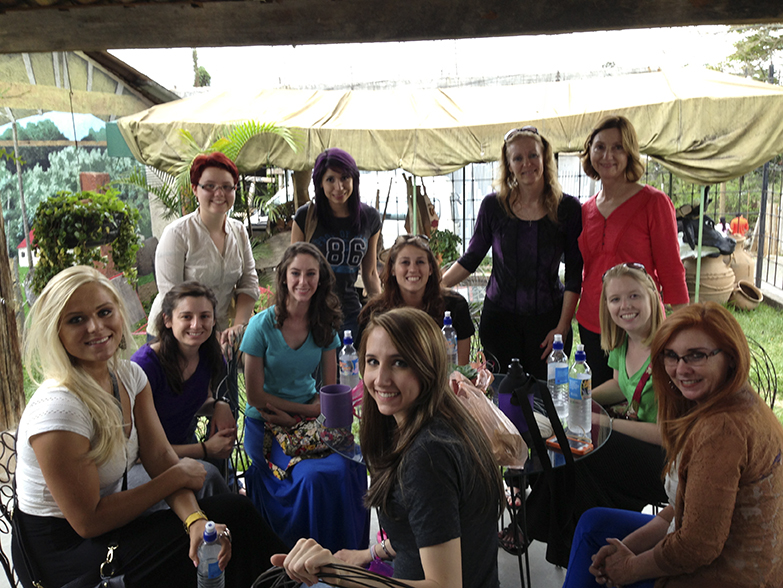Bachelor of Science in Nutrition
Concentrations include the Didactic Program in dietetics, exercise science, community or food service.
As society places greater emphasis on preventative healthcare, the need for professionals to help people make smarter food and fitness choices is rapidly increasing.
Combine education with your passion for a healthy lifestyle as a major in nutrition at ACU, where Christian values and ethics serve as a foundation.
Choose from one of four concentrations
Prepare for you desired career within the nutrition field
- If you’re interested in becoming a Registered Dietitian/Nutritionist, the dietetics concentration might be right for you.
- The exercise science concentration prepares you to counsel individuals in wellness centers or serves as a foundation for a future personal training program.
- The community concentration can lead to public education in a variety of settings.
- The food service concentration provides training in food management, safety and marketing.
The Didactic Program in Dietetics is accredited by the Accreditation Council for Education in Nutrition and Dietetics (ACEND a division of the Academy of Nutrition and Dietetics). The website (for ACEND) is https://www.eatrightpro.org/acend and email is ACEND@eatright.or.
ACEND can be contacted at 120 South Riverside Plaza, Suite 2190, Chicago, IL 60606-6995, 312-899-0040, ext. 5400. Entry into the DPD requires a formal application process. Students who are interested in becoming Registered Dietitians may apply to the Didactic Program in Dietetics (DPD) after passing 60 hours through a formal application and interview process.
Transfer students or current students wishing to change their major may also apply to the DPD after passing 60 hours and having taken at least 6 hours of nutrition courses at ACU. A GPA of 3.0 is required for entrance into the DPD. Graduates of the DPD are prepared to enter dietetic internships, after which they may sit for the Registered Dietitian examination. Registered Dietitians may find employment in healthcare facilities, community and public health nutrition programs, other government entities, private practice, school nutrition programs, sports nutrition and corporate wellness programs, university education, research, sales, marketing, restaurant management, and food companies. Learn more >
According to this site, an RDN current salary is approximately $52,834. Learn more >
- DPD Mission, Goals, Objectives, and Outcomes
- Criteria for Admittance into the DPD
- DPD Student Handbook (Revised September 2020)
- Application for Admittance into the DPD
Didactic Program in Dietetics majors may apply to dietetic internships accredited by the Accreditation Council for Education in Nutrition and Dietetics as they are completing the DPD requirements.
Verification statements will be issued to students by the Director of the DPD upon graduation or completion of the DPD requirements. These verification statements can be provided to Dietetic Internship Directors when applying to dietetic internships.
Many states, including Texas, require dietitians to be licensed in order to use the term Licensed Dietitian. The website for information on becoming a licensed dietitian may be found here.
A person who is registered by the Commission on Dietetic Registration (CDR), has already met the educational, experience, and examination requirements needed to apply for a Texas dietitian license.
An increased emphasis is placed on health promotion in our society today. The Dietary Guidelines for Americans by the Department of Health and Human Services and the U. S. Department of Agriculture recommend 60 minutes of moderate to vigorous intensity activity on most days. Other national organizations have similar recommendations. As a result, proper nutrition for exercise and sport has increased in importance for individuals to stay healthy before, during, and after exercise. Graduates with the Exercise Science concentration are trained to counsel individuals concerning proper nutrition practices in wellness centers or other exercise-related settings such as gyms or sports facilities. However, they are not prepared to counsel individuals concerning disease states. They can also receive a personal training certificate.
Nutrition professionals are in demand to educate the public in various settings. Graduates of the Community concentration are trained to effectively communicate nutrition messages to individuals and the public. They may find employment with the Extension Service, school nutrition programs, supermarkets, or in public health/government nutrition programs such as the Special Supplemental Nutrition Program for Women, Infants, and Children.
The food service industry affects virtually every person living in the U.S., and employment opportunities are expected to increase. Graduates of the Food Service concentration are trained in food management, food marketing principles, and food safety. They may find employment in school nutrition programs, food service facilities or restaurants as managers, or health departments as food inspectors.

Dr. Sheila Jones teaches in the Money Student Recreation and Wellness Center
Read MoreWhere can you work after graduation?
Note: For Registered Dietition and Nutritionist positions, a Dietetic
internship and passing of the Registration Examination for Dietitions
is required.
- healthcare facilities
- community and public health nutrition agencies
- private consulting in multiple venues
- nutrition programs in schools
- sports nutrition and corporate wellness facilities
- AgriLife Extension
- education in universities
- research facilities
- sales for nutritional companies
- marketing in corporations
- restaurants/food service facilities
- food companies
Clubs and Activities
Nutrition majors have many opportunities to learn outside the classroom, including:
- Student Academy of Nutrition and Dietetics
- Field Experiences and Practicums
- Human Performance Laboratory
- Student Recreation and Wellness Center
Degree Details
Tracks
Didactic Program in Dietetics (NDPD)
Community Nutrition (NUCO)
Exercise Science (NUEX)
Food Service (NUFS)
Required Hours
University Requirements: 56 credit hours + Major Requirements: 55-67 credit hours (Choice of 4 tracks) + Electives: 5-17 credit hours = Total Required: 128 credit hours*
*Based on track selection
Example Coursework
Medical Nutrition Therapy I, II, and III
Community Nutrition
Food Systems Organization and Management
Nutrition Through the Life Cycle
Department
Kinesiology and Nutrition
Application Deadlines
Regular: February 1st
National Candidates: May 1st
Early Bird: November 1st

